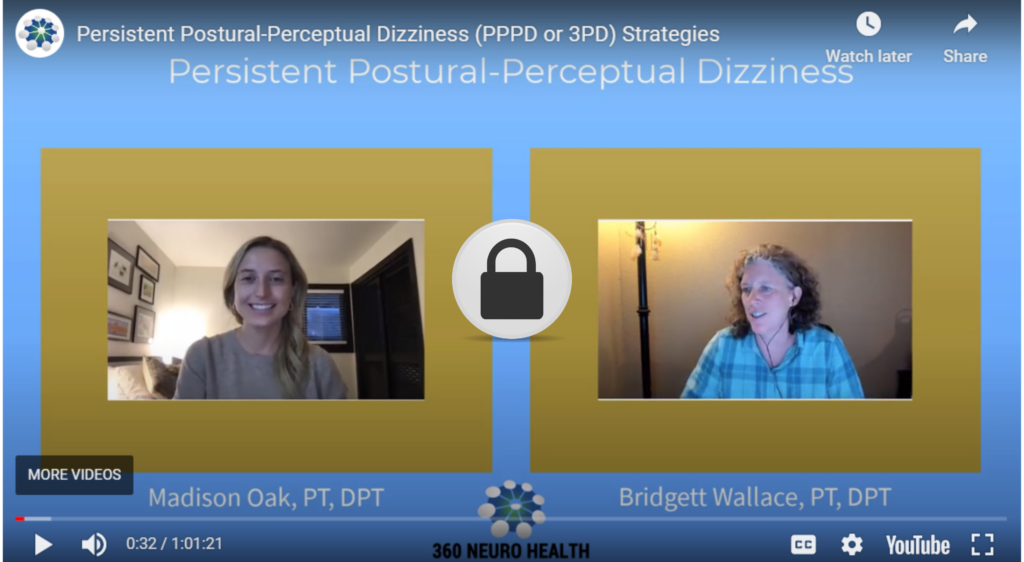Tools & Resources
login
Contact
Login
Testimonials
About
HOme
courses
360NeuroGO
tools & resources
Hello, there!
Ready to put context to your knowledge and turn it into practical application? You're in the right place. Let's get started!
For Industry professionals
For Industry Partners
Persistent Postural Perceptive Dizziness: 10 Things You Can Do
March 21, 2023
Persistent Postural-Perceptual Dizziness (PPPD or 3PD) is a common yet complicated vestibular-related disorder.
Persistent Postural Perceptual Dizziness is a chronic feeling of imbalance, dizziness, or unsteadiness without current physical dysfunction. It typically is triggered by a trauma, either physical or psychological, that hypersensitizes the nervous system. This sensitization causes the brain to interpret normal stimulus as threatening.
This is a software vs hardware issue. Physically, people who live with PPPD have good hardware: healthy bodies with intact nerves. However, the software, or signals to and from the brain, is not effectively communicating with the body. This means that the brain is not able to interpret the signals that it is receiving from our balance systems. As a result, your brain is not able to modulate movement to effectively keep you grounded.
It is important to understand that PPPD is true vestibular dysfunction, it is not imagined or fake. It requires therapy to reintegrate the incoming signals, regain balance, and decrease dizziness.
This brief video provides 10 ways you can approach and provide interventions for individuals with Persistent Postural Perceptive Dizziness (3PD):
Now available with 360NeuroGO Enterprise: Persistent Postural-Perceptual Dizziness (PPPD or 3PD) Treatment Strategies
Overview:
Persistent Postural-Perceptual Dizziness (PPPD or 3PD) is a common yet complicated vestibular-related disorder. 3PD can be disabling for patients and challenging for clinicians. We discuss treatment ideas for Persistent Postural-Perceptual Dizziness.
Duration:
Approximately 1 Hour
Instructors:
Bridgett Wallace, PT, DPT & Madison Oak, PT, DPT

RESOURCES & LINKS:
- Persistent Postural-Perceptual Dizziness (PPPD or 3PD) Treatment Strategies
- Note: this education is included with 360NeuroGO Enterprise
Speakers:
Bridgett Wallace, PT, DPT
Bridgett Wallace, PT, DPT, has a doctorate of physical therapy and holds competency-based certifications in vestibular rehabilitation and concussion management. Dr. Wallace has been treating patients with dizziness and balance disorders for more than 20 years and is the founder and President of 360 Balance & Dizziness – a specialty clinic for the evaluation and treatment of dizziness and balance disorders that includes both audiology and therapy services. She is also the co-founder and Director of Clinical Education for 360 Neuro Health Institute, which provides online, mobile, and live educational offerings for healthcare providers.
Madison Oak, PT, DPT
Dr. Madison Oak is a vestibular physical therapist, owner of Oak Physical Therapy & Wellness, and founder of @thevertigodoctor. She graduated from the University of San Francisco with a BS in Kinesiology and her Doctor of Physical Therapy at the University of Wisconsin – Madison. After completing a clinical internship at 360 Balance and Dizziness, she received her Certificate of Competency in Vestibular Rehabilitation from 360 Neuro Health and has been practicing Vestibular Rehabilitation ever since. Dr. Madison runs @thevertigodoctor on Instagram, Facebook, TikTok, Twitter and a blog to provide resources, support, group fitness classes, and more to anyone with a vestibular disorder. Currently, Madison practices Vestibular Rehabilitation virtually in 5 states across the US and runs Vestibular Group Fit, an online virtual group fitness program designed to promote movement and exercise in the vestibular community.
Leave a Reply Cancel reply
We're on a mission to put context to knowledge and turn it into practical application while creating multidisciplinary connections, knowing that working together increases access to meaningful content and awareness.
We're so glad you're here
Hello!
For practical strategies and updates follow us on Insta @360neurohealth
find US on
As co-founders of 360 Neuro Health, we continue to provide meaningful educational experiences through a shared and supportive multidisciplinary healthcare community and now we're excited to provide digital marketing solutions through 360 Digital Connect!
Plus, through 360 Living Balanced, we empower individuals experiencing dizziness and balance disorders to move beyond simply managing symptoms to reclaiming active, confident lives through personalized care, evidence-based treatments, and ongoing support.